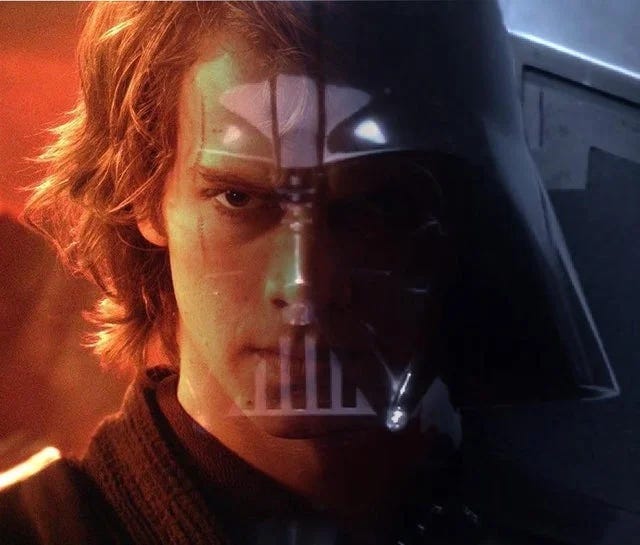Hey everyone,
Thank you for bearing with my tangents in May! I was really feeling overwhelmed and frustrated, but I’m feeling better now. And I’m ready to get back into the hero mini-series I started back in April.
We’ve already gone over Classic Heroes and Everyman Heroes. If you haven’t yet, I recommend checking them out first because I’ll be using them to compare and contrast the tragic hero archetype. Without further ado, Tragic Heroes!
Want to hear this essay read aloud in my very appealing Texas/California mishmash of an accent? Upgrade to paid today!
Tragic hero almost sounds like an oxymoron, doesn’t it? Don’t heroes always win? Not these guys, unfortunately.
In the most simple definition, tragic heroes are classic heroes gone wrong. They’re doing their best, but not only is their best not the best (like our everyman heroes), but they have a fatal flaw that means the story ends badly for them. This is the key—tragic heroes end in tragedy. It’s where the name comes from. Good examples of this trope are Hamlet and Jay Gatsby.

Everyone remembers the story of Hamlet, right? (If not, just follow me on Instagram, I can’t seem to stop talking about him lately.) Hamlet is just a college student doing frat boy things when his dad is murdered. The rest of the play is motivated by his desire to avenge his father’s death. Unfortunately, this obsession ends up costing him his life (don’t cry spoiler, the play was published in 1603).
Jay Gatsby’s life follows a similar tragic trajectory. He falls in love with Daisy Buchanan and gets rich just to impress her. The book is motivated by his desire to win her back. Unfortunately, that obsession ends up costing him his life. (Again, the book was published in 1925, y’all.)
I happened to pick two main characters whose obsessions are their downfall, but tragic heroes can have other fatal flaws. Romeo and Juliet are tragic heroes too—their flaws are that they’re terrible communicators and impulsive. Hester Prynne, in The Scarlet Letter, is another—her flaw is that she is too loyal and noble to name her lover, leading to her ostracization from the village while he walks free.
There are two key factors to a tragic hero:
They’re essentially good people who get a little sidetracked by love or trauma.
Their story ends sadly.
It’s in the name—tragic heroes live tragic lives. But they are heroes at their core. They mean well, even if a good therapist would discourage a lot of their behavior.
Tragic heroes are very similar to anti-heroes. And I find that, often, people who aren’t reading critically confuse the two. They take any flaw to mean that a character is either an anti-hero or a tragic hero, without seeing the differences between them. But there are two main differences between tragic heroes and anti-heroes:
Motivation. Tragic heroes always mean well, whereas anti-heroes don’t necessarily. I’ll get more into in my anti-heroes final installment, but the key to remember is that tragic heroes are trying to do the right thing.
Their endings. Anti-heroes can have happy endings, whereas tragic heroes never do.
You might be familiar with Oedipus of the Freudian Oedipus Complex (and the famous Oedipus Rex play by Sophocles). He often gets lumped in with tragic heroes but I would argue that he’s more of an anti-hero, or even a villain. The problem with Oedipus is that he is prideful and he kills people. He is not an essentially good person. Romeo might be impulsive and a bit of a fuckboy and Jay Gatsby might not have come by his money honestly, but they don’t feel good about murder. They are driven to kill when Plan A doesn’t go well. They are good people who got sidetracked.
Oedipus just kills the king because they annoy each other. The two characters just crossed paths, Oedipus isn’t fighting the king for something noble. That’s not decent person behavior!
Whereas Hamlet is a great example of a tragic hero because he initially tries to make his uncle confess to murder with a play. That’s good kid behavior! Murder gets introduced to the plot eventually because Hamlet loses his mind, but he doesn’t set out to kill anyone.
Tragic heroes remain heroes because the audience empathizes with them throughout the story, even as they fail. We empathize with Hamlet, it’s much harder to empathize with Oedipus.
To set up a good tragic hero story, it’s necessary to have strong villains, weak allies, and other outside forces. For instance, Hamlet only loses in his bid for vengeance because he’s young and inexperienced. He doesn’t have good guidance from a mentor figure and his allies—Rosencrantz, Guildenstern, Ophelia—all have their own stuff distracting them from the main mission. Moreover, unlike classic heroes, tragic heroes tend to not be good at the inspirational “rally the troops” type of speech. They can get people on their side for the easy stuff, but they usually end up alone when they have to face the final challenge.
Is Anakin Skywalker a Tragic Hero?
This question is also known as: How to divide a fandom with six words.
Anakin starts out good, right? He’s a jedi and wants to fight for justice against the Empire. But his fears of losing Padmé lead him to the dark side and he becomes Darth Vader, a formidable villain.
Anakin is definitely a tragic hero in the prequels. And if he had died instead of becoming Vader, this question would be easy to answer. But his time as a terrifying villain in Episodes four, five and six makes the question a bit fraught. It’s hard to call someone who is actively fighting for genocide a hero of any kind.
In the end, Anakin comes back to the right side. He saves his son, Luke, by sacrificing himself. But is that enough to redeem the harm he caused as Darth Vader? Usually, tragic heroes don’t cause a lot of pain to other people. The pain they cause is usually restricted to their direct enemy. Anakin breaks that rule.
It’s quite a character arc, one that’s really only possible in a longer series. Arguably, Anakin doesn’t have to occupy just one role, just like humans don’t occupy just one role their entire lives.
Interestingly, Elphaba in Wicked follows a similar character arc as Anakin! She means well and does her best, but eventually is misunderstood and ostracized from Oz. Jaded and upset, she becomes the Wicked Witch of the West in The Wizard of Oz and dies without ever redeeming herself.
I hope you enjoyed our third installment in the heroes mini-series! Let’s get the debate about Anakin going in the comments.
Don’t forget about our June writing hours! We get together, we write together, we commiserate. It’s a good time. Our next one is on June 24th at 10 am PT.
Psssst—paying subscribers get access to extra sessions! Learn more about them here.
And, finally, if you like my work you can also check out my podcast, Unruly Figures. It’s a celebration of rebels, rule-breakers, and ne’er-do-wells across time. Recently I’ve covered Hans Christian Andersen and Alan Turing. Come join us!
Keep reading with a 7-day free trial
Subscribe to Collected Rejections to keep reading this post and get 7 days of free access to the full post archives.





